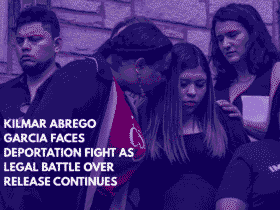NEW YORK – In a significant blow to President Donald Trump’s latest immigration strategy, a federal judge on Thursday permanently blocked the administration from using an 18th-century wartime law to deport Venezuelan migrants, marking the most expansive ruling yet against a central part of Trump’s controversial crackdown on immigration.
In a 36-page opinion, U.S. District Judge Fernando Rodriguez, a Trump appointee based in Brownsville, Texas, ruled that the administration’s use of the 1798 Alien Enemies Act (AEA) to justify fast-track deportations of alleged Tren de Aragua gang members “exceeds the scope of the statute and, as a result, is unlawful.”
What the Ruling Means
Rodriguez’s decision goes further than previous rulings by permanently blocking the Trump administration from applying the AEA to Venezuelan migrants detained in the Southern District of Texas. His court includes the facility from which 137 men were deported to El Salvador just hours after Trump invoked the AEA on March 15.
The ruling also marks the first outright judicial rejection of Trump’s claim that the Tren de Aragua gang posed a level of threat comparable to an “invasion” or “predatory incursion”—a key legal threshold under the AEA.
Background: Trump’s Use of the Alien Enemies Act
The Alien Enemies Act, passed in 1798, has historically been used during wartime, including to detain and deport individuals of Japanese, German, and Italian descent during World War II. In March 2025, Trump became the first president to invoke the law in peacetime, claiming that members of the Tren de Aragua, a Venezuelan gang, represented a national security threat.
The administration swiftly began deporting detained Venezuelans, many without due process, sparking outcry and legal action.
The Fallout and Court Challenges
Following the deportation of 137 Venezuelans to El Salvador on March 15, multiple courts—including in Colorado and Washington, D.C.—issued temporary restraining orders, requiring the administration to give detained migrants at least 21 days to contest removal.
But Judge Rodriguez’s ruling is the first to permanently block the application of the AEA in this context and directly challenges the administration’s legal interpretation of the law.
In his ruling, Rodriguez wrote that invoking wartime powers for peacetime immigration enforcement overreaches executive authority, echoing concerns raised by civil liberties groups.
ACLU: The Law Was Never Meant for This
Lee Gelernt, an attorney for the American Civil Liberties Union (ACLU), hailed the ruling as a major victory.
“The court critically held that the president cannot simply declare that there’s been an invasion of the U.S. and then unilaterally invoke an 18th-century wartime authority during peacetime,” Gelernt said.
The ACLU has also filed legal actions around the country, targeting deportations made under the AEA and has petitioned a federal judge in Washington, D.C., to order the return of migrants already deported to El Salvador—where the U.S. is reportedly paying the Bukele government $6 million to detain them in a Terrorism Confinement Center.
Judge James Boasberg has not yet ruled on that request.
White House Response
Despite the setback, the Trump administration is standing firm. White House spokesman Kush Desai said the ruling would be appealed and framed it as a political fight tied to Trump’s re-election mandate.
“The Trump administration is committed to unapologetically using every lever of power endowed to the executive branch by the Constitution and Congress to deliver on this mandate,” Desai said.
The case is expected to head to the Fifth U.S. Circuit Court of Appeals, which is widely viewed as one of the most conservative federal appellate courts in the country.











Leave a Reply